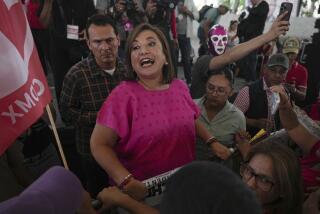U.S. Mildly Rebukes Manila on Poll Observers
- Share via
WASHINGTON — In a mild rebuke to the government of President Ferdinand E. Marcos, the State Department said Tuesday that the Philippine government’s decision to restrict foreign observers of the Feb. 7 presidential election is not desirable.
At the same time, State Department spokesman Bernard Kalb refused to say whether arrangements for the election are adequate to assure a fair outcome, a key concern of the United States.
On Monday, a top member of the Philippine Election Commission said foreign observers will be kept at least 50 yards from polling places, although they will be allowed to watch the vote count.
“It would have been preferable for observers to be permitted to observe the balloting process from within the polling place, as was the case in the parliamentary election of 1984 and, we understand, previous elections in the Philippines,” he said.
Nonetheless, Kalb praised the government’s decision to allow Filipino poll watchers from the National Movement for Free Elections and to permit foreign journalists and others to watch the tabulation of the votes.
Stresses Vote Count
Another State Department official, who asked not to be identified by name, said it would have been worse if foreign observers had been allowed inside the polls but excluded from the vote count, as is sometimes the case in Latin American countries.
“Although we expressed dismay (that) we won’t be there for the whole process, it isn’t all bad,” the official said.
He said the role of foreign observers is “mostly symbolic” anyway. The National Movement for Free Elections “will be allowed to be in the polling places and so will representatives of both (Filipino) political parties,” he said.
Kalb reiterated the Reagan Administration’s position that “the emphasis should be on a fair and credible election so perceived by the people of the Philippines.” But “insofar as making any judgments (about probable fairness) at this particular point, I shall step aside on that,” he added.
Comments on Military
On a related matter, Kalb complained about the slow pace of military reorganization in the Philippines and about Marcos’ apparent decision to permit Gen. Fabian C. Ver to remain as army chief of staff.
“General reform of the armed forces of the Philippines, including (appointment of) respected professional leadership, is absolutely necessary if the Philippines is to deal successfully with the growing Communist insurgency,” Kalb said.
“How Gen. Ver’s leadership squares with military reform is a question that only President Marcos can answer. The current reorganization of the armed forces of the Philippines so far falls far short of what most observers believe is badly needed to deal with the insurgency in all its dimensions.”
Ver was reinstated by Marcos seven weeks ago after he was acquitted on charges of involvement in the 1983 assassination of opposition leader Benigno S. Aquino Jr. Marcos has said that Ver eventually may wish to step down, but Kalb noted, “There are now no indications from Manila that General Ver will retire soon.”
More to Read
Sign up for Essential California
The most important California stories and recommendations in your inbox every morning.
You may occasionally receive promotional content from the Los Angeles Times.












